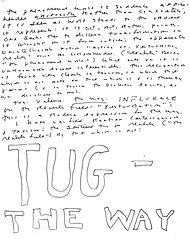Q: What is The Exegesis of Philip K. Dick?
Here are two quotes taken from the hardback cover:
“A great and calamitous sequence of arguments with the universe: poignant, terrifying, ludicrous, and brilliant. The Exegesis is the sort of book associated with legends and madmen, but Dick wasn’t a legend and he wasn’t mad. He lived among us, and was a genius.” – Jonathan Lethem
‘Based on thousands of pages of typed and hand-written notes, journal entries, letters, and story sketches, […] Dick documents his eight-year attempt to fathom what he called “2-3-74,” a postmodern visionary experience of the entire universe “transformed into information”.’
To briefly summarize what “2-3-74” was: Dick believed he had had a visionary experience in February and March 1974, and spent the next eight years trying to make sense of it.
—–
Here is a picture for scale: The Exegesis versus Ubik.
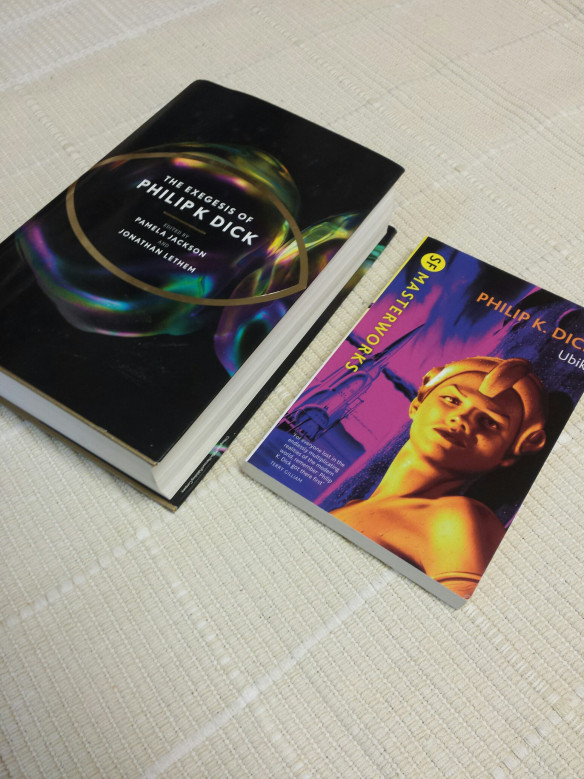
This is a BIG book. Not including the introduction, editors’ note, afterword, endnotes, and glossary, there are 900 pages of PKD’s Exegesis. With around 450 words per page, you’re talking about over 400,000 words, and this is the edited version of Dick’s notes. As you can imagine, this book is best suited for hardcore fans or scholars of PKD.
I teamed up with a few blogger friends as we attempted to read The Exegesis from January to December 2016, tackling it in twelve 75-page installments. This was the brainstorm of Nicolette Stewart, one half of the cool website: we are bookpunks. Our Dickean journey was made more tolerable by Nikki’s idea of accompanying our mammoth read with one PKD novel per month. (So, you will find a lot of Philip K. Dick reviews on my site.)
The Exegesis is not an easy book to read, nor to review. Thus, I will copy and paste my “reading progress” notes from Goodreads, as well as add some quotes from the book that stood out for me. (I’ve had to edit my own notes and quotes to prevent this “review” from turning into a dissertation! Apologies for the length; if you make it to the end, I’ll be very impressed.)
The Exegesis of Philip K. Dick: One Reader’s Experience
January 2016
“The bare bones, so to speak, of the world, our world, are revealed.” (p.3)
—–
“Several times I’ve had the uncanny experience of meeting people who resemble persons, characters, I’d previously made up for my novels.” (p.13)
Was Dick writing his books or were his books writing him?
—–
“Something strange, however, exists in my life and seems to have for a long time; whether it comes from my odd lifestyle or causes the lifestyle I don’t know. But there it is.” (p.22)
I’m taking this in small doses as there’s so much to wrap your head around.
February 2016
‘If I were to say to you: “The universe which we perceive is a hologram,” you might think I had said something original, until you realized that I had only updated Plato’s metaphor of the images flashed on the walls of our cave, images which we take to be real.’ (p.80)
Plato, Ancient Greece and Rome, philosophy, the roots of religion, co-existing dimensions, Immanent Mind, and Ubik. His writing style makes it extremely readable.
—–
“The reality of orthogonal time, cyclic time, would make it possible for the Golden Age (the time before the fall) to return, restoring all which has been lost.” (p.115)
—–
“What is possible, though, as I’ve said before, is the notion of “mitosis-like” splittings of the present (due to time dysfunctions, perhaps in our past) that result in alternate worlds (as in ‘The Man in the High Castle’).” (p.142)
mitosis = division of the nucleus of a cell. From the Greek word which means “warp thread“.
Yes, my thread has been warped by PKD.
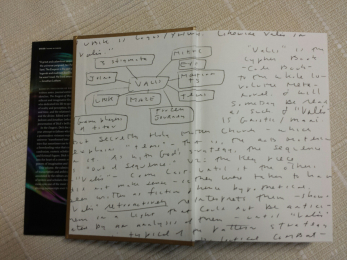
Interior, front cover
March 2016
Oh yes! Something I’ve been interested in since I read Huxley’s The Doors of Perception (1954): The brain as a “filter of consciousness,” from a footnote by Jeff Kripal:
‘Dick […] came to a conclusion that many other thoughtful people – from William James and Henri Bergson to Aldous Huxley – have come to, namely, that the brain may be a kind of “filter,” “transmitter,” or “reducer” of consciousness. When this filter-brain is temporarily shut down or suppressed by whatever means (mental illness, psychedelics, political torture, meditative discipline, a car wreck, a profound sexual experience, heart surgery), other forms of consciousness and reality, many of them cosmic in scope and nature, can and often do shine through.’ – Jeff Kripal (*Footnote, page 153)
—–
Well, I enjoyed the *chemically-challenged* letter to Claudia Bush, but after that it all went a bit too theological. He still keeps bringing up Ubik. Is Ubik the answer?
—–
“I feel retrospectively that Flow my Tears and very likely Frolix 8 were both engineered subliminally, carrying in encoded […] form material from the Logos or Godhead.” (p.186)
Okay, so the Godhead subliminally aided PKD in his creation of those two novels. Who knew?!…
—–
“… prior to early ’74 I would experience fear and tension, especially at night, for no accountable reason.” (p.221)
Yep, I know that feeling.
April 2016
“This fits my grand theme in my writing: the awful truth about reality is obscured from us. My other theme about androids programmed to imagine they are human (i.e., self-determining) is another basic facet of this.” (p.231)
—–
“With no therapist to guide me, with no human guide, just Christ and my cat Pinky I made it back. I have written down all that I saw, heard and understood. It was not delusion I found during my trip – it was absolute reality.” (p.243)
Love this quote almost as much as PKD loved his cat. But I’m struggling with this at the moment, guys! If Phil is Elijah and Zeus is Zagreus, who is Zebra? Phil’s dead cat…?
—–
“The world is not merely counterfeit […]; there is more: it is counterfeit, but under it lies another world, and it is this other world, this Logos world, which filters or breaks through. Ubik, then, is a step-up from Maze (of Death) and 3 Stigmata (of Palmer Eldritch) in presenting this.” (p.272)
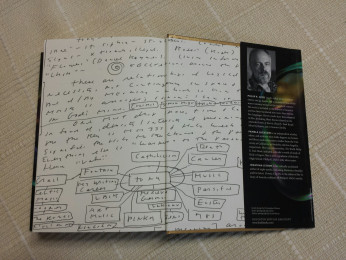
May 2016
“What I write doesn’t make a whole lot of sense. There is fun and religion and psychotic horror strewn about like a bunch of hats. Also, there is a social or sociological drift – rather than toward the hard sciences, the overall impression is childish but interesting. This is not a sophisticated person writing.” (p.324)
—–
‘Dick’s thematic concern for the “little guy,” as opposed to the galactic royalty featured in space opera, was one of the defining features of his work,’ (*Footnote by David Gill, p.325)
—–
“Eye (in the Sky), (Time out of) Joint, 3 Stigmata, Ubik and Maze (of Death) are the same novel written over and over again. The characters are all out cold and lying around together on the floor mass hallucinating a world. Why […]? Because […] this is our condition: we’re mass hallucinating this 1970s world.” (p.337)
July 2016
“Ubik is the most important book ever written. Ubik the entity is the Tao. And the Logos or Christ or Sophia. Ubik is true; it deals with the (1) dialectic basis of all process; and (2) with the Tao.” (p. 509)
This is heavy, heavy, heavy going. The book’s pretty heavy, too.
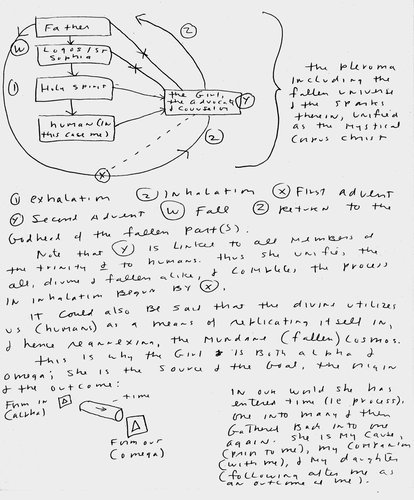
One of the pages filled with PKD’s notes.
August 2016
“World was past; I was future. […] I had been moving faster and faster for decades due to the amphetamines.” (p.556)
September 2016
“Like a lot of readers, I consider Dick an idea-man rather than a stylist. Generally he doesn’t write sentences that hold within them whole worlds; rather, his collective work has to be taken together to add up to something […] bigger on the inside than out.” *footnote by Steve Erickson.
November 2016
Ten months down, two to go. 75 pages per month doesn’t sound hard but it has been difficult to keep reading at times. These are big pages full of small type and heavy ideas. I wonder how many pens PKD got through writing this Exegesis?…
December 22, 2016 – Finished Reading!!!
Phew! Made it to the end. I don’t think I would’ve finished it if not for Nikki from bookpunks’ great idea of reading it in monthly 75-page installments.
It’s less a book than one artist’s search for meaning. The first one hundred pages contain a series of letters PKD wrote to a number of people. These are fascinating correspondences, often very funny, and offer a glimpse into Dick’s unique mind. They are also, probably, the most readable section of the book. After the letters, it becomes more and more theoretical and theological as PKD searches his life, dreams, and works for answers. There is some beautiful prose to be found in here, and the footnotes are always well written and interesting. But it’s hard going at times.
The Exegesis of Philip K. Dick is only recommended for hardcore PKD fans and scholars of his work.
